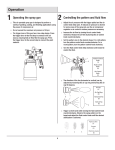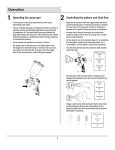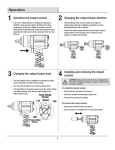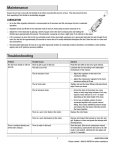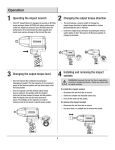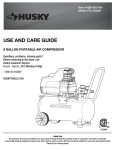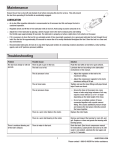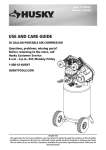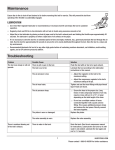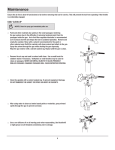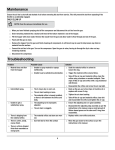Download Husky H4920SSG Instructions / Assembly
Transcript
Operation 1 Operating the spray gun □□ This air operated spray gun is designed to perform a variety of painting, coating, and finishing applications using the power of compressor air. □□ Do not exceed the maximum air pressure of 45 psi. □□ The trigger lever of this gun has a two-step design. Press the trigger lever to the first step to connect to the air source, ensuring that air flow fills the spray gun. Press the trigger lever to the second step to connect the paint material. 2 Controlling the pattern and fluid flow □□ Adjust the air pressure with the trigger pulled. If reduced air pressure is desired for some areas of the spray job, use the air compressor regulator to reduce pressure as necessary. □□ Set the pattern size to the desired shape. For a full pattern, turn the pattern control knob counterclockwise. For a round pattern, turn the pattern control knob clockwise. □□ Turn the fluid control clockwise to reduce fluid and counter clockwise to increase fluid. 1 2 Pattern Control Knob (1) Fluid Control Knob (2) □□ The direction of the fan (horizontal or vertical) can be adjusted by loosening the air cap ring and turning the air cap 90 degrees. Air Cap (1) 2 1 Air Cap Ring (2) 3 4 Horizontal Fan (3) Vertical Fan (4) □□ Trigger a short burst while turning the fluid control knob counterclockwise. Observe the spray pattern on the target and adjust the fluid control knob until the desired atomization is achieved. 6 Operation (continued) 3 □□ Keep the nozzle about 6 to 9 inches from the work surface throughout the stroke and always keep the gun in motion while spraying. Stopping gun movement in mid-stroke will cause a build up of paint and result in runs. Do not fan the gun from side to side while painting. This will cause a build-up of paint in the center of the stroke and an insufficient coating at each end. Preparing and loading the paint □□ Thoroughly mix and thin the paint in accordance with the paint manufacturer’s instructions. Most materials will spray readily if thinned properly. □□ Strain the material through cheese cloth or a paint strainer. □□ Fill the paint canister to the maximum of the 3/4 full capacity carefully. □□ Trigger the gun properly. Start the gun moving at the beginning of the stroke BEFORE SQUEEZING THE TRIGGER. Release the trigger BEFORE STOPPING GUN MOVEMENT at the end of the stroke. This procedure will feather (blend) each stroke with the next without showing overlap or unevenness. □□ Set up a piece of cardboard or other scrap material to use as a target. Adjust the spray gun for the best spray pattern and the best atomization option. □□ Test the consistency of the material by making a few strokes on a cardboard target. If the material still appears too thick, add a small amount of thinner. THIN WITH CARE!! Do not exceed paint manufacturer’s thinning recommendations. □□ The amount of paint being applied can be varied by the speed of the stroke, distance from the surface and adjustment of the fluid control knob. □□ Use a piece of cardboard as a shield to catch overspray at the edges of the work to protect other surfaces. Use masking tape to cover other areas if needed. 4 Painting with the sprayer □□ Begin spraying. Always keep the spray gun a a right angle to the work surface. 7HUSKYTOOLS.COM Please contact 1-888-43-HUSKY for further assistance.



